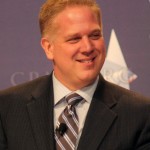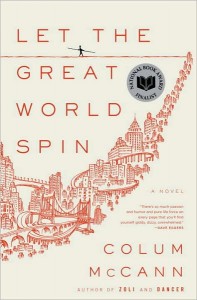“When I see three oranges, I juggle,” the then 24-year-old highwire daredevil Philippe Petit is supposed to have said in 1974 after his 110-story-high prance between the two unfinished towers of the World Trade Center. “When I see two towers, I walk.”
 When Glenn Beck sees his foot, he inserts it in his mouth, and then brags about the taste.
When Glenn Beck sees his foot, he inserts it in his mouth, and then brags about the taste.
Mr. Scatter hesitates to write about the ubiquitous Mr. Beck. He looks back fondly on his days of innocence, just last summer, when he was able to ask, with all seriousness, “Who’s Glenn Beck?” How he’d managed to cocoon himself for so long he doesn’t know, but he misses those warm and fuzzy days.
 Two recent events, conjoined by accident, have brought Mr. Beck unfortunately to mind.
Two recent events, conjoined by accident, have brought Mr. Beck unfortunately to mind.
First, Mr. Scatter attended his monthly book group, where the topic of discussion was Let the Great World Spin, last year’s National Book Award-winning novel by Colum McCann, in which Petit’s act of acrobatic bravado is the springboard to a grand contemplation of chance, hope and grace.
Second, Mr. Scatter read Laurie Goodstein’s report in the New York Times, Outraged by Glenn Beck’s Salvo, Christians Fire Back. It seems that Mr. Beck, on his radio program, urged his followers to “run as fast as you can” if they see or hear anything in their churches referring to “social justice” or “economic justice.” Those are code words, he said, for Communism and Nazism and should be shunned like, well, the devil. It’s an odd pairing, at any rate: Was Mr. Beck down at the pool hall or out stoning adulteresses the day his high school history class covered the Siege of Leningrad? “If you have a priest that is pushing social justice,” he intoned, “go find another parish. Go alert your bishop.”
This upset a lot of Christians, including not a few fundamentalists and evangelicals, many of whom have been in a quiet vanguard of such social and economic justice actions as rebuilding communities struck by crisis (the Gulf Coast, Haiti), spreading literacy, and helping subsistence cultures feed and shelter themselves on their own terms. You could argue, although I’m sure Mr. Beck doesn’t, that Jimmy Carter has been our finest post-president because of his commitment to a Christianity of social and economic justice.
Mr. Scatter understands that Mr. Beck makes a living out of this sort of profitable jeremiad, and he supposes there’s some sort of thrill in poking at rattlesnakes. He understands that Mr. Beck is a rear-guard agitator, a gatherer and focuser of resentments from people who believe they’ve been mistreated and left behind by the course of history.
He is also glad to see a cross-section of Christians responding to the calumny, striking back at the co-option of the name “Christian” for the exclusive use of radical reactionaries of the demagogic right. Divisiveness, resentment and exclusion seem strangely unstable rocks on which to build a church.
In McCann’s novel, it’s the artist Petit who inspires the metaphor of hope and possibility. But it’s the conflicted man of action, the seeker Corrigan, who spreads a quiet theology of deeds, not dogma. Not even deeds, really, but a fundamental notion of treating people with acceptance and respect. Corrigan can’t live up to his own ideals — no human could — but his simple concept of Christianity is about as far from Mr. Beck’s us-versus-them theology as you can get:
Corrigan told me once that Christ was quite easy to understand. He went where He was supposed to go. He stayed where He was needed. Ho took little or nothing along, a pair of sandals, a bit of a shirt, a few odds and ends to stave off the loneliness. He never rejected the world. If He had rejected it, He would have been rejecting mystery. And if He rejected mystery, He would have been rejecting faith.
What Corrigan wanted was a fully believable God, one you could find in the grime of the everyday. The comfort he got from the hard, cold truth — the filth, the war, the poverty — was that life could be capable of small beauties. He wasn’t interested in the glorious tales of the afterlife or the notions of a honey-soaked heaven. To him that was a dressing room for hell. Rather he consoled himself with the fact that, in the real world, when he looked closely into the darkness he might find the presence of a light, damaged and bruised, but a little light all the same. He wanted, quite simply, for the world to be a better place, and he was in the habit of hoping for it. Out of that came some sort of triumph that went beyond theological proof, a cause for optimism against all the evidence.
“Someday the meek might actually want it,” he said.
Like a lot of other people, Mr. Scatter has spent a lifetime thinking about these matters, and something akin to liberation theology is the closest that any catechism comes to making sense to him. We are each other. Love one another. Help where help is needed. Understand that the fortunate have a responsibility to the unfortunate, and that means not just a handout but also an even opportunity. Do unto others as we would have others do unto us. It’s an impossible standard but a magnificent goal. What is a life of the spirit that is not led moment to moment, that is not open to things that make us uncomfortable, that does not seek justice as a matter of humility and respect? Without such things, what right does any religion have to lay a claim on any of us?
Nothing humble about Mr. Beck, whose interpretation of the way, the truth and the life seems to run to roadblocks and litmus tests and a devil’s portion of scorn for anyone not in ideological lockstep with him. It’s a free world, in spite of the best efforts of the megaphone radicals to clamp it down, and Mr. Beck has the right to profit from his attention-grabbing misrepresentations of conservatism, Christianity and, one assumes, literature. As for him and his house, they will serve his career.
What would Jesus do? Mr. Scatter isn’t sure. Maybe throw the huckster out of the temple. Maybe offer him a loaf and a fish, and ask him to pass them along.
Or maybe just turn off the radio.
*
ILLUSTRATIONS, from top:
— Glenn Beck. Photo: Gage Skidmore, Feb. 20, 2010. Wikimedia Commons
— Colum McCann’s National Book Award winner, “Let the Great World Spin”
— Novelist Colum McCann. Photo: Brennan Bourke